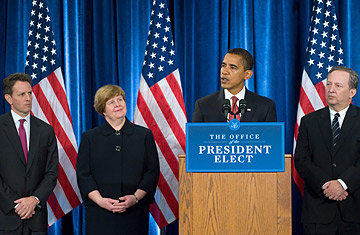
President-elect Barack Obama with, from left, Timothy Geithner, Christina Romer and Larry Summers during a press conference in Chicago on Nov. 24
Taking effective control of U.S. economic policy two months before he will be sworn into office, President-elect Barack Obama promised an "aggressive" economic recovery plan in the first month of 2009 that will include tax cuts and new spending on jobs, energy infrastructure, health care and education.
Obama's vow to move "swiftly and boldly" is a sign that the incoming Administration is not waiting until the Inauguration to plot a new economic course. Nor, from the sound of it, does it seem like Obama feels he has the luxury of waiting. "We are facing an economic crisis of historic proportion," he said. "While we cannot underestimate the challenges we face, we cannot underestimate our capacity to overcome them. We cannot hesitate and we cannot delay." (See pictures of Barack Obama's campaign behind the scenes.)
Obama's comments were yet another indication that Washington will move in the first weeks of 2009 to approve an economic stimulus package worth $500 billion or more. Obama declined to specify the size and said he would ask his new economic advisers to make a recommendation in the coming weeks. But he noted what he called a "pretty rare" consensus between conservative and liberal economists that a massive fiscal stimulus was needed.
As expected, Obama announced that he would tap a well-known duo of economic advisers. Timothy Geithner, president of the New York Federal Reserve, will be his Treasury Secretary, and Larry Summers, a former Treasury Secretary, will lead his National Economic Council at the White House. He also named Melody Barnes, a longtime aide to Senator Edward Kennedy, to lead his Domestic Policy Council; and Christine Romer, a University of California, Berkeley, economist, to chair the Council of Economic Advisers, two other White House policy shops. Obama said this group would put some flesh on the bones of an economic stimulus plan and that he would in "coming weeks" share their outline with the American people.
Exactly how large that package might turn out to be is anyone's guess. Only a few weeks ago, proponents spoke of a package worth $150 billion. Now, with banks continuing not to lend and the economy shrinking, stimulus package estimates have crossed $500 billion and are heading toward $700 billion.
If the consensus for such a massive infusion holds — and with large Democratic majorities in both Houses of Congress, there is little reason to think otherwise — Obama would be able to include in the measure a number of programs he has advocated: tax cuts, jobs and spending initiatives, health-care reform, aid to beleaguered industries and energy-efficient investments and infrastructure.
In choosing Geithner and Summers, Obama has tapped two of his party's brightest economic lights. Summers, who became president of Harvard after leaving his job in the Clinton Cabinet, is the economic leader of his generation, but he sometimes plays poorly in the public spotlight. Geithner, a Summers protégé, is smoother and more politically deft, able to work both for the Clinton team and alongside the Bush Administration. Summers, working from the White House, will most likely have Obama's ear, but it will be Geithner's job to speak to the markets, much as a horse whisperer might calm a jittery mare.
In his brief remarks today, Obama also hinted that he might not raise taxes on the wealthiest Americans until 2011, perhaps waiting until the Bush tax cuts on top earners expire in 2010. He said he would speak tomorrow about the need to slice from the federal budget spending programs that are no longer needed to help pay for the stimulus. And he noted that he would be receiving daily briefings from his economic team about financial developments.
Obama was careful in his comments about the U.S. auto industry, which is on the brink of bankruptcy and seeking a government bailout. While describing the industry "historically as the backbone of America's manufacturing base," he split the difference between advocating direct loans of the kind denied by Congress last week and doing nothing. Obama vowed to "help the auto industry," but noted, "We can't just write a blank check ... I was surprised that they did not have a better thought-out proposal when they arrived in Congress."
